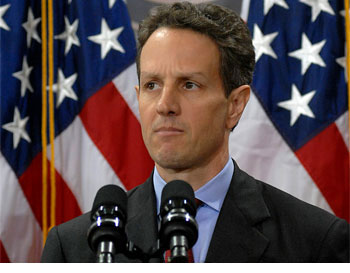 The details of the new White House banking policy are somewhat vague and in places borderline incoherent – e.g., what exactly does “The President’s proposal will place broader limits on the excessive growth of the market share of liabilities at the largest financial firms…” mean (from point 2 in yesterday’s short and poorly edited statement)?
The details of the new White House banking policy are somewhat vague and in places borderline incoherent – e.g., what exactly does “The President’s proposal will place broader limits on the excessive growth of the market share of liabilities at the largest financial firms…” mean (from point 2 in yesterday’s short and poorly edited statement)?
And the size restrictions currently in pencil on the back on an envelope near the president’s desk are almost certainly too lenient; the goal should not be a return to the status quo of 2007 or thereabouts – the clock must be rolled back much further and “too big to fail” completely removed from the financial map.
But the general principle behind our ”Volcker Rule” is clear. Here’s what President Obama said, “Banks will no longer be allowed to own, invest, or sponsor hedge funds, private equity funds, or proprietary trading operations for their own profit, unrelated to serving their customers.”
Whatever you think of that notion or the exact wording, this clearly implies that banks will get smaller. Secretary Geithner apparently does not get this (transcript).
There are two possibilities given that Tim Geithner is a smart person with a great deal of relevant media experience – he did not misspeak.
1. Geithner is not on board with the policy shift. This would be understandable, as it directly repudiates what he has worked hard to achieve over the past year.
2. Geithner does agree with the obvious interpretation – provided by the president – of the Volcker Rule and associated principles. As an expert, he is certainly entitled to his own view, but this is beyond awkward.
President Obama said, quite plainly, “So if these folks [the big banks] want a fight, it’s a fight I’m ready to have”. He cannot fight this issue and these people effectively if his Treasury Secretary is not on board.
If the Democrats go at this fundamental shift in policy in a half-hearted manner or with mixed messages, they will be hammered so badly in November that the Massachusetts special election will feel like a victory in comparison.
Kindly ask Secretary Geithner to appear on all the weekend news shows with a convincing “clarification”.
- Bulenox: Get 45% to 91% OFF ... Use Discount Code: UNO
- Risk Our Money Not Yours | Get 50% to 90% OFF ... Use Discount Code: MMBVBKSM
Disclaimer: This page contains affiliate links. If you choose to make a purchase after clicking a link, we may receive a commission at no additional cost to you. Thank you for your support!


Leave a Reply